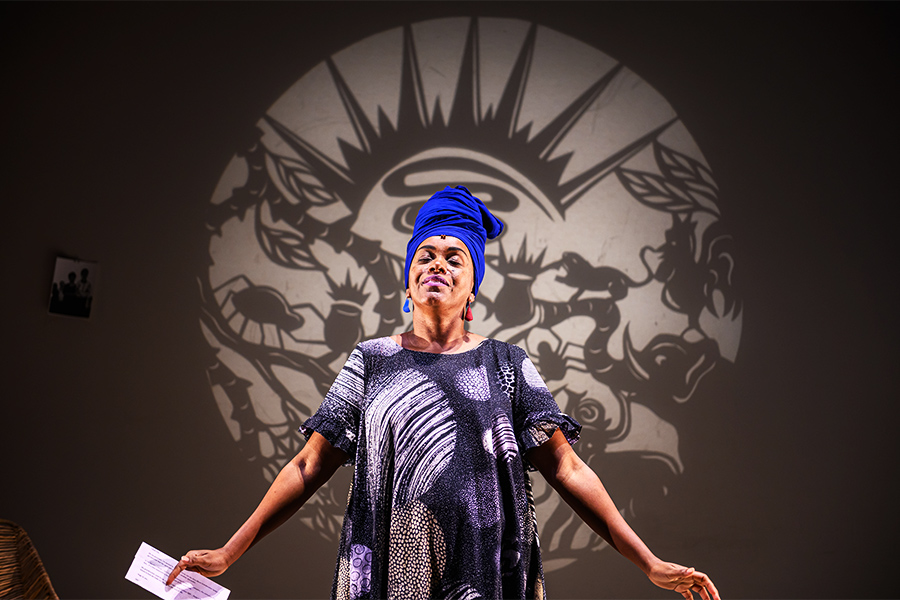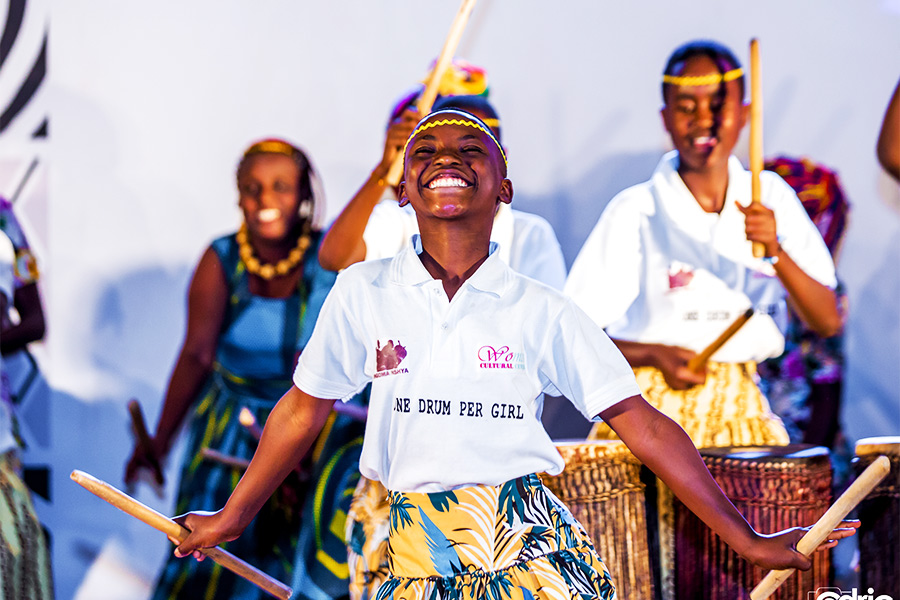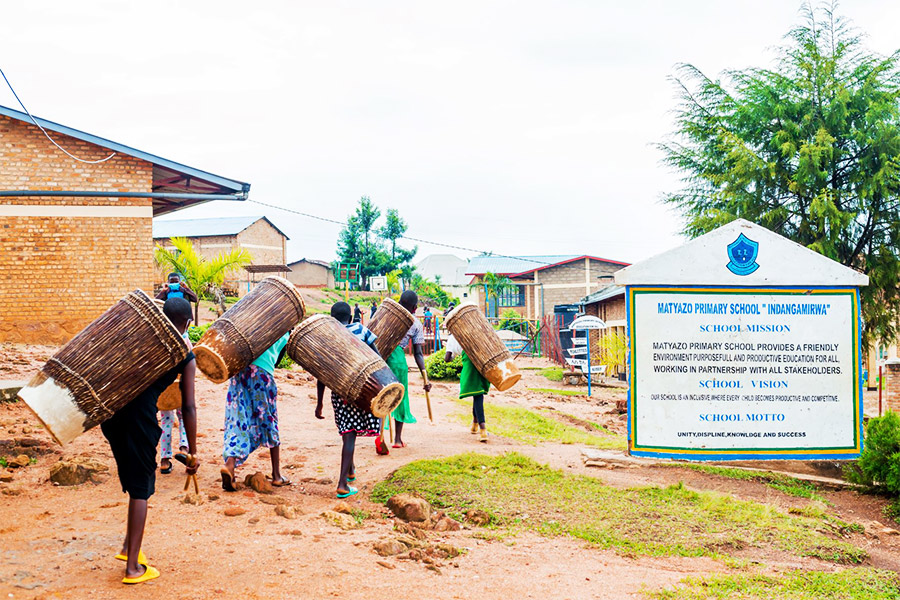African legend: Kiki Katese
Kiki has been transforming Rwanda’s arts scene for almost two decades, breaking plenty of taboos in the process
Catching a performance by Rwanda’s first-ever female drumming group, Ingoma Nshya, is a joyous experience. Wearing wide smiles, women in matching outfits and multicoloured hair braids pound away with their drumsticks, jumping and twirling in unison as the beat and their whoops and hollers build to a crescendo. It’s a ground-breaking (and ground-shaking) show made possible by just one woman – the group’s pioneering founder, Odile Gakire Katese.

Kiki Katese in The Book of Life. By Dahlia Katz

Over the last 18 years, ‘Kiki’, as she is known, has taken Ingoma Nshya (which translates as ‘New Drum’) from a collection of novice drummers in the Rwandan city of Huye to an ensemble that receives rapturous applause and rave reviews wherever they play around the world. She achieved this despite encountering serious headwinds from traditionalists in Rwanda who believe women should not be drumming.
Ingoma Nshya is just one of a number of projects launched by Katese. The entrepreneur, director, writer and performer is also behind Rwanda’s first professional contemporary dance company (Amizero Dance), has set up several arts festivals, written successful stage shows and has even opened the country’s first local ice cream parlour.
“I think it’s fair to say I like a challenge,” she smiles. “In fact, challenges make me more creative as an artist. I think I have the ability to see things in the emptiness. I know something is going to happen if I really work at it. As an artist, I never feel hopeless.”

Ingoma Nshya in action. By Hagenimana Athanase

Katese was born and raised in exile in the DRC after her parents fled massacres taking place in Rwanda in the 1960s and 70s. She moved to Rwanda in 1996 and went on to study theatre in Paris before taking up the post of creative director at the University Centre for Arts and Drama in Huye in 2003. There, she immediately started to shake things up.
“When I came to the arts in Rwanda, I found that women were being put in a box – people expected them to only do dancing or maybe singing,” she recalls. “I wanted to put women in new creative spaces – writing, filmmaking, sound engineering and drumming. The only workshop that worked because it didn’t require funds was drumming. So, forming Ingoma Nshya was meant to be.”
Katese soon realised that planning a female drumming group was a more revolutionary idea than she realised. “I didn’t know women playing the drums was taboo in Rwanda,” she says. “I noticed we didn’t have any female drummers, so I went to the national museum and asked why. Someone told me: ‘You’re not strong enough. Why would you want to do that?’ The attitude seemed to be that we were harming the drumming heritage, while, in fact, we were the ones trying to preserve a disappearing craft.”

Sweet treats at Sweet Dreams ice cream shop. By Ishimwe Cedric

Despite the resistance, Katese forged ahead, starting Ingoma Nshya in 2004. She knew she was on the right track when she saw the enjoyment that drumming brought to women from all backgrounds in Rwanda. “The women would drum once and I then I wouldn’t have to beg them to come back the next day,” she says. “We didn’t get funds and support, but we kept going because it was fun, and it’s lasted 18 years.” Ingoma Nshya finally secured funding in 2008 and now has 12 full-time drummers who perform and teach drumming to 600 girls at schools in Rwanda.
The ensemble’s most high-profile success has been their role in The Book of Life, a moving stage production created by Katese to commemorate the 1994 genocide in Rwanda by using letters from survivors and perpetrators of the atrocity written to those who died. The project is part of Katese’s mission to ensure Rwanda’s past is chronicled by Rwandans and not outsiders.

The Gira Ingoma ('One drum per girl') project – sometimes, one drum is all you need. By Ishimwe Cedric

“The country’s history has been written by colonials, academics and historians with all these seeds of division, and I wanted to ensure Rwandans participated in the remaking of the story,” says Katese, who acts as the show’s narrator and who shares her own letter to the grandmother she lost. “I don’t want to create a culture that is made in Rwanda, but made of Rwanda – that is what I dream of, that in Rwanda we take ownership and share things the way we want.”
Katese’s ability to bring Rwandans together extends beyond her stage productions. In 2010, the entrepreneur opened Sweet Dreams, Rwanda’s first local ice cream parlour, in Huye. The business shares the same DNA as Ingoma Nshya – it’s run by women who learn new skills, contribute to the local economy and put smiles on people’s faces.
“A frivolous thing like an ice cream can be a tool of empowerment. A drum can be an empowering tool, too.”
“I’ve always said that if I had to sell something, it wouldn’t be shoes or clothes, but joy,” Katese says. “I want to sell that happy experience, whether it’s through song, drumming or ice cream.”
The business has inspired Katese’s next stage production. Called Sweet Dreams, the musical will look back at the journey of the women who work in the ice cream parlour and the drummers of Ingoma Nshya.

The Gira Ingoma project introduces girls to percussion and arts at an early age. By Ishimwe Cedric

“It’s about rehabilitating women as human beings, validating their dreams even if they seem frivolous, like an ice cream or a drum,” Katese says. “A frivolous thing like an ice cream can be a tool of empowerment. A drum can be an empowering tool, too.”
While the Sweet Dreams parlour represents the progress women are making in business in Rwanda, it also shows how far there still is to go to reach full equality when it comes to the art scene. The building in Huye doubles as a rehearsal space for Ingoma Nshya, since the group has nowhere else to practise. It’s a conundrum Katese is looking to rectify through her Woman Cultural Centre, a company she launched in 2016 to help inscribe women in the cultural and creative industries in Rwanda.
“We are buying plots because we want to create creative spaces,” she says. “The patriarchal system is not making room for us and if we don’t address this, we will vanish. Having a space will ensure that, on a daily basis, artists have a place where they can practice. And then we also need access to annual budgets from the government.”

A scene from The Book of Life. By Jon Davey

With so much to do, Katese admits her biggest personal obstacles are exhaustion and a lack of time to get everything done. Her desire to change Rwanda’s cultural landscape and act as a role model cuts through any fatigue, though.
“I hope to inspire people and make a contribution,” she says. “If I can fight for an ice cream or a drum, then other girls will be able to fight for bigger dreams than that.”